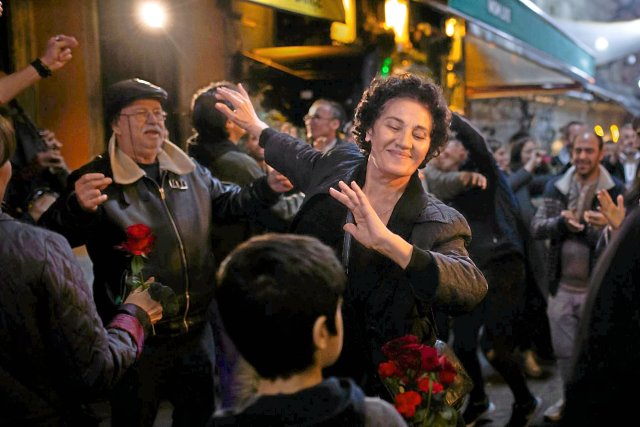Scene from “Crossing”, the festival’s opening film.
Photo: Haydar Tastan
At the 24th GoEast Film Festival in Wiesbaden, which ends this Tuesday, numerous films from Central and Eastern Europe as well as Central Asia and the Caucasus were shown again this year. The Georgian-Turkish road movie “Crossing” opened the festival – an unusual and moving film by director Levan Akin, whose gay love story “When We Danced” was internationally celebrated.
On the outskirts of Batumi, retired teacher Lia (Mzia Arabuli) searches for her niece Tekla, a trans woman who was chased out of the house by her father. The young man Achi (Lucas Kankava) was just looking for an opportunity to escape the monotonous life in his parents’ home, which was far too cramped. He claims to know that Tekla went to Istanbul. A short time later, he and Lia are sitting in the car that was secretly “borrowed” from Achi’s father and driving towards the border with rap music playing loudly.
In Istanbul, Achi establishes contact with the trans community and translates Lia’s questions, who clearly show how shocked she is to be looking for her niece among sex workers. Lia doesn’t understand why Tekla chose this life, hated and discriminated against, with sex work as the only means of income.
»Crossing« shows the harshness of discrimination, poverty and transphobia, but fortunately does not portray trans people and other marginalized people as victims, but rather as self-empowered and part of a strong community in which people support each other. »Crossing« tells of solidarity under the most adverse circumstances and overcoming prejudices without claiming an ideal world.
The choice of opening film points to one of the focal points of this year’s festival: queer identities and queer art in and from Eastern Europe. In addition to several short film programs, a selection of Soviet and Yugoslavian films with more or less subtle queer themes were also shown, including the Ukrainian production “A Strict Youngster” from 1936. The film, which was banned as not conforming to socialist realism, addressed the issue openly free (heterosexual) love beyond marriage and surprises with homoerotic imagery.
The festival was accompanied by a three-day symposium on the topic of “The ‘Other’ Queers”. The “others” refer to those queers who have so far received little attention (in Western Europe). In several discussion rounds, artists and activists from different countries spoke about their experiences: In countries that are hostile to queer people, queer (film) art is heavily dependent on financial support from Western Europe. But usually only what fits into a certain narrative is supported. For example, post-Yugoslav art is expected to address the trauma of the wars in the 1990s, and Ukrainian artists are expected to address the Russian invasion. Other perspectives and art from the underground usually remain invisible. This makes it all the more important to create safe spaces for art that consciously breaks social norms and expectations.
A wide range of perspectives were represented in the festival’s competition. The films shown included the Kazakh coming-of-age film “Bauryna Salu,” the Ukrainian social drama “Stepne,” the documentary “Fairy Garden” from Hungary, which deals with solidarity among the homeless, and the satire “Processes” from Belarus.
The drama “Plague” from the Siberian Republic of Sakha/Yakutia made a great impression. Since the collapse of the Soviet Union, a vibrant Yakut cinema has developed with numerous films made without government subsidies, mostly in Yakut rather than Russian. Dmitrii Davydov, director of “Plague,” didn’t go to film school and makes films alongside his work as a teacher. But »Plague« by no means seems like an amateur production, but is an impressive work of art that can easily compete with the greats of international cinema.
The titular “plague” that has infected the film’s protagonists (they are all men) is violence. The drama takes place in a small, desolate village in the middle of nowhere. The conditions are poor, the work is hard. And the villagers make life even more difficult for each other. The reserved Ivan (Georgy Bessonov) is regularly bullied and taken advantage of by his neighbors. His son Taras (Erhan Sleptsov) is ashamed of his father. He doesn’t want to be one of the losers because he has already learned: In this society, strength is the ideal, you have to be “masculine” and subjugate others.
Taras begins to spend more and more time with neighbor Vlad (Evgeniy Nikolaev). Vlad has a penchant for bullying others and beating the strength into his own son. Taras likes how Vlad tells people what to do and what not to do. In concentrated, realistic black and white shots, the film impressively shows the normalization of violence in Russian society.
This world without cohesion and empathy shown in “Plague” seems to be the exact opposite of the solidarity and community of the Istanbul trans community from the opening film “Crossing”. These two extremes show the wide range not only of the GoEast festival program, but of cinema from the so-called “East” in general.
From May 1st to 8th, individual films from the festival can be streamed online for €7 at: http://online.filmfestival-goeast.de/de/home
Subscribe to the “nd”

Being left is complicated.
We keep track!
With our digital promotional subscription you can read all issues of »nd« digitally (nd.App or nd.Epaper) for little money at home or on the go.
Subscribe now!
judi bola online sbobet88 sbobet link sbobet
